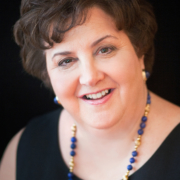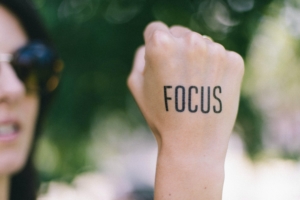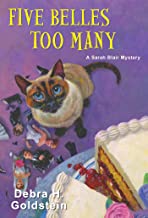Clicking Our Heels – When We Know Our Writing is Good
Lynn McPherson – If it makes me laugh, I like to think it could make someone else laugh, too.
Gay Yellen – If it makes me laugh, or feel sad, or touches me in the way I want it to touch readers, I’m guessing it will work.
Lois Winston – Having previously spent more than a decade working for a literary agency, I will be the first to admit that not only does it take a lot to impress me, but that I’m my own harshest critic. It’s obvious to me when I’m coasting in my writing, whether it’s a sentence, a scene, or an entire chapter, and I’ll work on it until I consider it fixed. That which can’t be fixed gets ditched.
Kathryn Lane – I write, edit, re-edit. Then I leave it for a month or so and read it again. That’s when I know whether it’s good or not, but the ultimate proof is when readers like my work.
Dru Ann Love – If something I read is good, I shout it out on social media.
Donnell Ann Bell – If it moves me and propels me further in the story. If I keep tweaking it, the words probably aren’t the best fit.
Anita Carter – If I still find it interesting after setting it aside for a few weeks and rereading it with fresh eyes.
T.K. Thorne – I don’t like the word “good.” I focus on whether it “works.” That is happening if it moves me in some way, makes me laugh, cry, reveals character, moves the plot ahead, etc., and if the writing itself enhances these things or at least doesn’t get in the way
Shari Randall/Meri Allen – I ask myself, does it elicit emotion? Laughter? Surprise? If it does, even after several readings, then I’m satisfied.
Mary Lee Ashford – don’t think I’m a very good judge of whether something I write is good. It’s so difficult to have perspective on your own work. If it’s making sense to me and I think it’s moving along, I’ll keep going. Then if it still makes sense or the scene/chapter seems to work when reread a day or two later, I decide that it’s good enough for my critique group and beta readers to read. After that it’s ready for the editor and off on its journey on to readers. Then when I hear from readers: that they enjoyed the book, that it made them laugh (or cry), or that something in the story resonated with them. I guess, it’s then that I decide maybe that the writing was okay.
Debra H. Goldstein – If the text writes smoothly from the zone rather than me struggling for a concept, I know the piece should be good, but I won’t know for sure until I get reader feedback.
Linda Rodriguez – Every once in a while, I’ll be immersed in writing something, and when I emerge, I’ll read it over and feel this little zing inside that tells me I’ve struck pay dirt. Doesn’t mean I won’t wind up doing a good bit of editing and polishing, but I know the heart of it is good. Usually, however, I don’t know until I’ve set it aside for a little while and come back to it with that cold editor’s eye.
Bethany Maines – I think there are two different kinds of good. Is the writing itself—sentence structure, word choice, etc—of a high quality? For that, I can usually tell by how many junk words I have or haven’t used (very, really, just) and whether or not it makes me have an emotional reaction every time I read it. The second kind of good is whether or not the story itself is good. I have had ideas that are wonderful, but I don’t always have the skill to execute them to their fullest. Sometimes I have to wait until I feel confident to tackle those. I usually feel like those ideas are the ones that make me excited. But at the end of the day, I always feel like my writing probably could have been better, so maybe this isn’t my best question.
Barbara Eikmeier – My husband is often my first reader. He’s a tough critic so if he tells me he thinks it’s good I feel like it must be good.
Saralyn Richard – I need to have a vague sense that I have accomplished what I set out to do in each chapter that I write, but I don’t really know that it’s good until a reader tells me so.
Robin Hillyer-Miles – I think something is good if, after having it rest a bit and reading it, I feel emotional.

 WHERE DO IDEAS COME FROM?
WHERE DO IDEAS COME FROM?
 with your words.” It’s no fun when your critique partner or editor says your research is showing or, this is filler and unnecessary. In effect, editors call the term overwriting. I have a DRAFT/CUT file for every book. Just as a book that lacks critical layering and reads like a draft in which something seems missing, by overwriting you chance your reader saying, “Get to the point,” and putting the book down.
with your words.” It’s no fun when your critique partner or editor says your research is showing or, this is filler and unnecessary. In effect, editors call the term overwriting. I have a DRAFT/CUT file for every book. Just as a book that lacks critical layering and reads like a draft in which something seems missing, by overwriting you chance your reader saying, “Get to the point,” and putting the book down.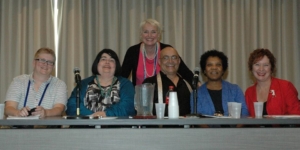 The Arts Are For Everyone! by Linda Rodriguez
The Arts Are For Everyone! by Linda Rodriguez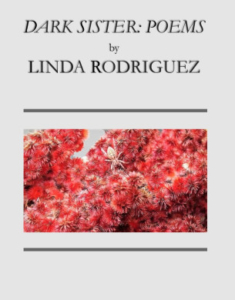


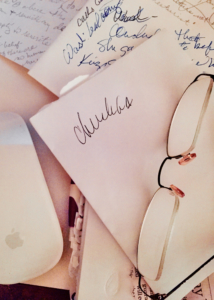 When the writing is going well, I’m listening to Samantha and Carter and their supporting cast as they dictate their words to me. Older people use different words than younger adults and children do. Sticklers for facts, such as my detective, Buron Washington, are more clipped and precise when they speak. And so on, down to a new character whose vocabulary is unique unto itself.
When the writing is going well, I’m listening to Samantha and Carter and their supporting cast as they dictate their words to me. Older people use different words than younger adults and children do. Sticklers for facts, such as my detective, Buron Washington, are more clipped and precise when they speak. And so on, down to a new character whose vocabulary is unique unto itself.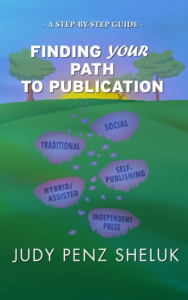 I’m delighted to welcome Judy Penz Sheluk as my guest to talk about her new release: Finding Your Path to Publication: A Step-by-Step Guide. Because I’ve loved her two fiction series: The Glass Dolphin mysteries and the Marketville mysteries, I know this will be a valuable non-fiction tool for writers. See you next month! —Debra H. Goldstein
I’m delighted to welcome Judy Penz Sheluk as my guest to talk about her new release: Finding Your Path to Publication: A Step-by-Step Guide. Because I’ve loved her two fiction series: The Glass Dolphin mysteries and the Marketville mysteries, I know this will be a valuable non-fiction tool for writers. See you next month! —Debra H. Goldstein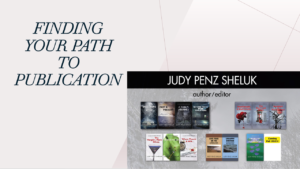 published and publishing options than whether I (or anyone else) had succeeded at NaNoWriMo. That led to the librarian asking if I might be willing to prepare a presentation on the topic. I remembered how much I’d learned since signing my first book contract in 2014, and not all those lessons came easy. In fact, some of them were downright painful.
published and publishing options than whether I (or anyone else) had succeeded at NaNoWriMo. That led to the librarian asking if I might be willing to prepare a presentation on the topic. I remembered how much I’d learned since signing my first book contract in 2014, and not all those lessons came easy. In fact, some of them were downright painful.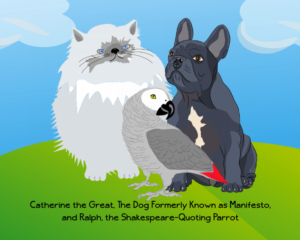 By Lois Winston
By Lois Winston What do you do when you’re suffering from the literary equivalent of a bad day on the mound? You’re all set to hurl a fast ball that should nip the corner of the strike zone and send the batter swinging at air when you wind up tossing a lob that he hits out of the park. In other words, you’ve got writer’s block.
What do you do when you’re suffering from the literary equivalent of a bad day on the mound? You’re all set to hurl a fast ball that should nip the corner of the strike zone and send the batter swinging at air when you wind up tossing a lob that he hits out of the park. In other words, you’ve got writer’s block.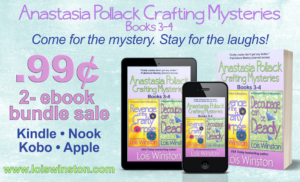 Also, through the end of the month, the Anastasia Pollack Crafting Mysteries, Books 3-4, featuring Revenge of the Crafty Corpse and Decoupage Can Be Deadly, is on sale for only .99 cents. Find buy links
Also, through the end of the month, the Anastasia Pollack Crafting Mysteries, Books 3-4, featuring Revenge of the Crafty Corpse and Decoupage Can Be Deadly, is on sale for only .99 cents. Find buy links 